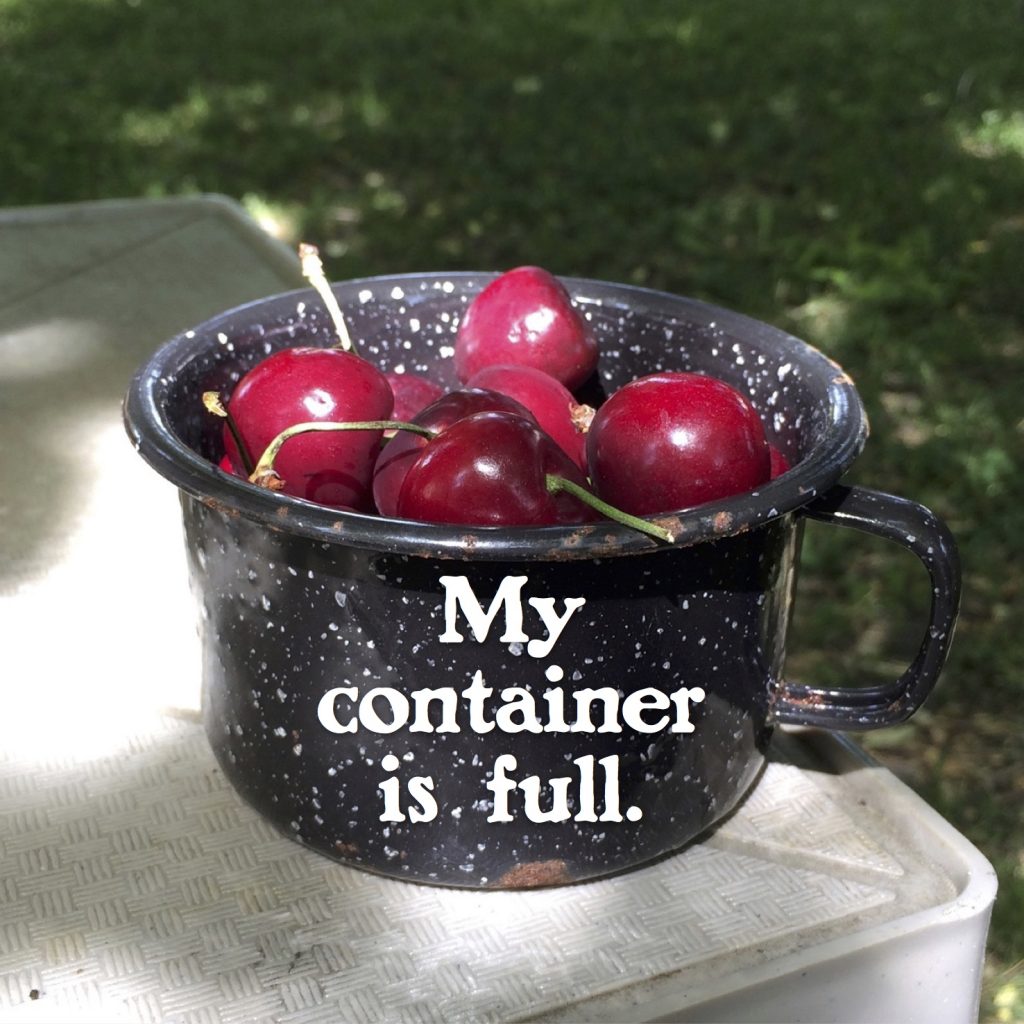What to do when your bowl is full

When I spoke in Florida last month, I recounted a story of a time when I was getting too many requests from people who wanted me to hold space for them when I was personally depleted and had to start saying to people “I’m at capacity – you’ll have to find someone else to hold space for you, or come back once I have replenished myself.”
I didn’t think, at the time, that I’d said anything particularly profound, until we broke for lunch and several people came up to me to say “Thank you for offering me that phrase, ‘I’m at capacity.’ I’m going to use that one in the future.”
A couple of weeks later, I was still getting emails about it, and almost every one mentioned how grateful they are to now have that phrase to use. For whatever reason, in that crowd of people who work with young people dealing with grief and trauma, that was what people most needed to hear.
When I teach about holding space for people, I talk about how holding space is like “being the bowl”, holding people gently and firmly, offering them containment and support, but not putting a lid on the bowl so that they have freedom and autonomy. Sometimes, though, that bowl gets full and we have no more space to offer people. That’s when we need a way to communicate to people…. “I’m at capacity.”
That phrase can mean many things. It can mean that we have too much grief of our own to hold and we don’t have the strength to offer comfort to others. It can mean that we’re near exhaustion from holding space for too many people and our bowl is starting to show signs of wear and tear. In can mean that we recognize it’s a good time for us to “go dark” and not engage in anything but our own learning and growth for awhile.
When we say “I’m at capacity” we are under no obligation to explain to others what we mean. It often feels like a reflex to give a long explanation or over-apologize, but that’s usually a sign that we don’t feel that we deserve to take time for ourselves or that other people have more value than we do. Just like “no” is a complete answer, “I’m at capacity” is a complete answer.
Imagine if we could all wear some kind of symbol – a lapel pin of a bowl, for example, with the ability to adjust the fullness of the bowl – to let each other know how much capacity we currently have. If I see that your bowl is full, I might ask what I could carry on your behalf. If your bowl is empty, I might ask if you’ve got a moment to listen to a story I just need someone to hold space for.
What we often don’t recognize when we are considering our own capacity is how much energy our emotional labour requires. One of the functions of growing up in an era of industrialization and capitalism is that we value money, productivity, and material goods over less tangible things like emotional labour, so we don’t have any understanding of how to measure the emotional labour that may be exhausting us.
For those dealing with depression, for example, it requires an immense amount of emotional labour just to get out of bed in the morning and smile at your kids over breakfast. You will probably reach capacity far sooner than other people. For those supporting parents with dementia, it can require vast storehouses of emotional labour to show up every day and put up with possible abuse from formerly loving parents. Your capacity beyond that will be limited. For those wrestling with addiction, all of your emotional labour is probably going into resisting the next temptation. For those working in classrooms with children with learning disabilities, you may have reached your emotional labour capacity by 3 p.m. and have nothing left to cook a healthy supper in the evening. For those living in poverty or fighting the oppression of racism, homophobia, or ablism, all of your emotional labour might be spent in simply trying to survive in a world not designed with you in mind.
When someone tells us, in whatever language they choose to use, that they are at capacity, we must simply believe them because we don’t know how much energy it takes to live life in their bodies. And when we need to say “I am at capacity”, we have a right to be believed and not questioned for how weak or selfish we may be.
This summer, I’ll be using that phrase regularly to let people know when I need to step away. If for example, you sent me an email and I haven’t yet gotten back to me, it’s not because I haven’t read it or don’t want to engage with you, it’s because it sometimes takes a lot of emotional labour to get through all of the beautiful and openhearted emails people send me. (Thank you! I always read them!) If you want to hire me as a coach but noticed that my door is closed for the summer, that’s because “I’m at capacity” creating the content and holding space for my coach/facilitator program. If you notice that my response time is slower on social media, it may be because “I’m at capacity” and have gone off on vacation with my daughters.
Try it for yourself. The next time someone asks for something you know will require too much energy or emotional labour on your part, simply say “I’m at capacity.” It’s not unkind to say so – it’s simply a way to care for your own storehouse of energy.
P.S. If your container is full, perhaps you need a retreat to help you hold it all? Consider coming to Nourish in August.
